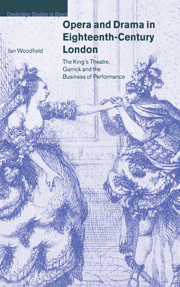 Opera and Drama in Eighteenth-Century London
Opera and Drama in Eighteenth-Century London Published online by Cambridge University Press: 22 September 2009
The Managers of the Opera to the Lord Chamberlain
The managers of the Opera beg permission to solicit the Lord Chamberlains protection, and to lay before his Lordship a real state of the hardships under which they suffer.
They beg leave to represent to his Lordship that it is impossible for the Receipts of Italian Opera's only to support the necessary expences.
That the Salaries of the first Singers and Dancers being so enormous they are at a larger yearly expence than the other Theatres, and instead of six Nights in a Week have in effect only one as on the Tuesdays they constantly play to great loss.
That the Subscription Saturday Nights are only twenty five and the few nights after the Subscription scarce worth taking, as the People of fashion are out of town.
That the Kings Theatre was originally a play house under his Majestys immediate protection and that of the Lord Chamberlain and continued such till Mr Collier came into a compromise with the Managers of Drury Lane to suspend giving plays at the Opera House on condition the Managers of Drury Lane engaged not to play on Opera Nights and to allow the Directors of the Opera as a further compensation Two Hundred Pounds a Year: an Agreement which has not been fulfill'd on the side of the Patentees of the other Theatre for many years: on the contrary, they have given the strongest pieces they possibly cou'd at both houses, on Opera Nights, and given both comic and serious English Operas with Italian Music, to the great detriment of the Managers of the Opera.
To save this book to your Kindle, first ensure [email protected] is added to your Approved Personal Document E-mail List under your Personal Document Settings on the Manage Your Content and Devices page of your Amazon account. Then enter the ‘name’ part of your Kindle email address below. Find out more about saving to your Kindle.
Note you can select to save to either the @free.kindle.com or @kindle.com variations. ‘@free.kindle.com’ emails are free but can only be saved to your device when it is connected to wi-fi. ‘@kindle.com’ emails can be delivered even when you are not connected to wi-fi, but note that service fees apply.
Find out more about the Kindle Personal Document Service.
To save content items to your account, please confirm that you agree to abide by our usage policies. If this is the first time you use this feature, you will be asked to authorise Cambridge Core to connect with your account. Find out more about saving content to Dropbox.
To save content items to your account, please confirm that you agree to abide by our usage policies. If this is the first time you use this feature, you will be asked to authorise Cambridge Core to connect with your account. Find out more about saving content to Google Drive.